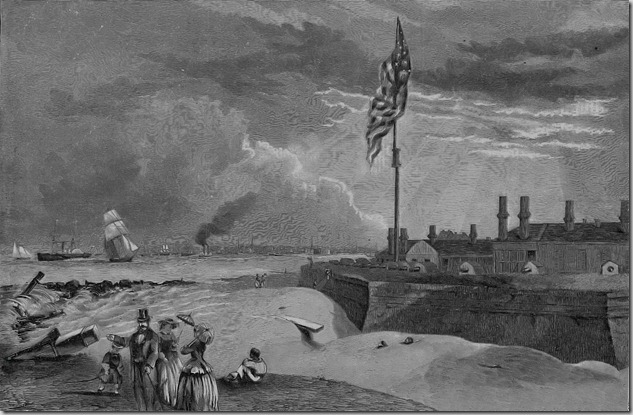On November 13, 1860, U.S. Senator Robert Toombs gave a speech to the Legislature of Georgia on “the present state of the country and the prospect before us.”
For those interested, the complete speech is available.
Excerpts from the speech related to States’ rights (though that specific phrase was not used):

—–
We have not sought this conflict; we have sought too long to avoid it; our forbearance has been construed into weakness, our magnanimity into fear, until the vindication of our manhood, as well as the defence of our rights, is required at our hands.

—–
Mr. Jefferson acquired Louisiana, extending from the Balize to the British possessions on the north, and from the Mississippi to the Pacific Ocean — a country larger than the whole United States at the time of the acknowledgment of their independence. He guaranteed the protection of the Federal Government by treaty to all the inhabitants of the purchased territory, in their lives, liberties, property and religion — sanctioned by law the right of all the people of the United States to emigrate into the territory with all of their property of every kind, (expressly including slaves,) to build up new States, and to come into the Union with such constitutions as they might choose to make.

—–
With these vast advantages, ordinary and extraordinary, one would have supposed the North would have been content, and would have at least respected the security and tranquility of such obedient and profitable brethren; but such is not human nature. They despised the patient victims of their avarice, and they very soon began a war upon our political rights and social institutions, marked by every act of perfidy and treachery which could add a darker hue to such a warfare.

—–
The South at all times demanded nothing but equality in the common territories, equal enjoyment of them with their property, to that extended to Northern citizens and their property—nothing more. They said, we pay our part in all the blood and treasure expended in their acquisition. Give us equality of enjoyment, equal right to expansion—it is as necessary to our prosperity as yours.

—–
This conflict, at least, is irrepressible—it is easily understood—we demand the equal right with the North to go into the common Territories with all of our property, slaves included, and to be there protected in its peaceable enjoyment by the Federal Government, until such Territories may come into the Union as equal States—then we admit them with or without slavery, as the people themselves may decide for themselves.

—–
In pursuance of this clause of the Constitution, Congress, in 1797, during Washington’s administration, passed a Fugitive Slave law; that act never was faithfully respected all over the North, but it was not obstructed by State legislation until within the last thirty years; but the spirit of hostility to our rights became more active and determined, and in 1850 that act was found totally insufficient to recover and return fugitives from labor; therefore the act of 1850 was passed.

—–
Some of them punish us with penitentiary punishment as felons for even claiming our own slaves within their limits, even by his own consent; others by ingenious contrivances prevent the possibility of your sustaining your rights in their limits, where they seek to compel you to go, and then punish you by fine and infamous punishments for asserting your rights and failing to get them. This is the fidelity of our brethren (!) to their plighted faith—their of repeated oaths! Yet some excellent people among us want some more of such securities for our rights, our peace, and security.

—–
Within a year or two after, a similar case occurred with New-York, while Seward was Governor. He refused, and attempted to cover himself under the idea that there could be no property in slaves. Virginia made the same demand on him, with like results and like submission; and from that day to this that constitutional right has been practically surrendered in the case of negro-stealing.

—–
Gentlemen, I have thus shown you the violations of our constitutional rights by our confederates; I have shown you that they are plain, palpable, deliberate, and dangerous; that they are committed by the executive, legislative, and judicial departments of the State governments of our confederates—that all their wrongs are approved by the people of these States.

—–
I say the election of Lincoln, with all of its surroundings, is sufficient. What is the significance of his election? It is the indorsement, by the non-slaveholding States, of all those acts of aggression upon our rights by all these States, legislatures, governors, judges, and people. He is elected by the perpetrators of these wrongs with the purpose and intent to aid and support them in wrong-doing.

—–
As for me, I will take any place in the great conflict for rights which you may assign. I will take none in the Federal Government during Mr. Lincoln’s administration.

—–
Make my name infamous forever, if you will, but save Georgia. I have pointed out your wrongs, your danger, your duty. You have claimed nothing but that rights be respected and that justice be done. Emblazon it on your banner— fight for it, win it, or perish in the effort.











